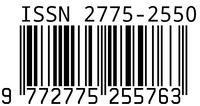Muhammadiyah as a Pillar of Civil Society: The Dynamics of Indonesian National Politics In The Perspective of Dar Al Ahdi Wa Al Syahadah
DOI:
https://doi.org/10.51773/ajrs.v5i1.372Keywords:
Muhammadiyah, Dar al Ahdi wa al Shahadah, civil society, Indonesian national politics, social justiceAbstract
Muhammadiyah, as one of the pillars of civil society in Indonesia, has an essential role in this country's political and social dynamics, primarily through the application of the Dar al Ahdi wa al Shahadah concept. This research aims to analyze the influence of Muhammadiyah in shaping public policy and strengthening civil society with a focus on their contribution to education and health, as well as advocacy for social justice and democracy. The method used is a Systematic Literature Review (SLR), which examines various literature covering the period from 2015 to 2020. The research results show that Muhammadiyah plays a significant role in strengthening the structure of civil society through political education, transformation of thought, and participation in national politics. The organization also actively advocates for government transparency and accountability, which directly contributes to improving community welfare. The implications of this research emphasize the importance of integrating religious values into public policy to promote social justice and strengthen civil society. This research paves the way for further studies on the role of religious organizations in national politics and societal development.
References
Alam, M. D. (2021). PEMBANGUNAN SOSIAL-POLITIK INDONESIA: MENILIK MASALAH KLASIK DI KALIMANTAN TENGAH. Journal Ilmu Sosial, Politik Dan Pemerintahan.
Al-Hamdi, R. (2020). Paradigma Politik Muhammadiyah. books.google.com.
Aminullah Elhady. (2015). Muhammadiyah: A Reform Movement for Empowerment and Enlightenment. In Proceedings of ICIC2015–International Conference on Empowering Islamic Civilization in the 21st Century, 183–190.
Andini, D. F. (2013). DINAMIKA PARTISIPASI PEREMPUAN DALAM POLITIK DI MESIR.
Argenti, G. (2017). Civil Society Dan Politik Moral Muhammadiyah.
Arifai, S. (2000). Konsep murabahah dalam perspektif fiqh dan praktisi. Jurnal Al-Ribath STAI Al-Azhar Gowa, 1(2), 146–152.
Bachtiar, H. (2020). Dar al-’ahd wa al-shahadah: Muhammadiyah’s position and thoughts on negara pancasila. Studia Islamika, 27(3), 485–513. https://doi.org/10.36712/sdi.v27i3.11325
Darmayanti, R., Nurhakim, M., & Utsman, Y. O. O. (2024). Historisitas Muhammadiyah: Bagaimana gagasan sang pendiri Muhammadiyah sebagai “ gerakan Islam progresif ” ?
Dewanto, D., & Herbawani, C. K. (2022). Faktor-Faktor yang Mempengaruhi Kinerja Karyawan Proyek Konstruksi: Systematic Review. Media Kesehatan Masyarakat Indonesia, 21(2), 142–147. https://doi.org/10.14710/mkmi.21.2.142-147
Elihami, E., & Basir, R. (2018). THE MUHAMMADIYAH AS EDUCATION MOVEMENT. 5(September), 188–194.
Halim, A. (2013). KONSEP POLITIK SYI’AH IMAMIYAH TENTANG WILAYAT FAQIH.
Hasnan Bachtiar, Junaedi, M., Muharram, F., Yani, M., Suyaman, P., Akib, I., Raihan, A., Novelti, N., Sadikin, S., Elihami, E., Basir, R., Wahyudi, Istiani, N., Islamy, A., Almu’tasim, A., Niam, Z. W., Santoso, G., Latief, H., Nashir, H., … Pratama, P. Y. (2020). Tracing the roots of Muhammadiyah thought on the concepts of Dār Al-‘Ahdi Wa Al-Syahādah. Studia Islamika, 27(1), 485–513. https://doi.org/10.36712/sdi.v27i3.11325
Ilham Yuli Isdiyanto, F. Muhammadi, U. F. (2022). Tracing the roots of Muhammadiyah thought on the concepts of Dār Al-‘Ahdi Wa Al-Syahādah. Legality : Jurnal Ilmiah Hukum.
Jeremy Menchik. (2019). Islam and Democracy in Indonesia: Tolerance Without Liberalism. RESENSI, 1.
Latief, H., & Nashir, H. (2020). Local Dynamics and Global Engagements of the Islamic Modernist Movement in Contemporary Indonesia: The Case of Muhammadiyah (2000-2020). Journal of Current Southeast Asian Affairs, 39(2), 290–309. https://doi.org/10.1177/1868103420910514
Moher, D., Liberati, A., Tetzlaff, J., Altman, D. G., Antes, G., Atkins, D., Barbour, V., Barrowman, N., Berlin, J. A., Clark, J., Clarke, M., Cook, D., D’Amico, R., Deeks, J. J., Devereaux, P. J., Dickersin, K., Egger, M., Ernst, E., Gøtzsche, P. C., … Tugwell, P. (2009). Preferred reporting items for systematic reviews and meta-analyses: The PRISMA statement. PLoS Medicine, 6(7). https://doi.org/10.1371/journal.pmed.1000097
Ritaudin, M. S. (2017). PROMOSI ISLAM MODERAT MENURUT KETUM (MUI) LAMPUNG DAN REKTOR UNIVERSITAS ISLAM NEGERI (UIN) RADEN INTAN LAMPUNG. https://doi.org/10.24042/tapis.v13i2.2034
Sadikin. (2021). Transformasi Pemikiran Politik Intelektual Muhammadiyah dalam Penguatan civil society di Indonesia Sadikin. Journal of Chemical Information and Modeling, 53(February), 2021.
Sadikin, S., & Affandi, I. (2019). Gerakan Muhammadiyah dari Perspektif Pendidikan Kewarganegaraan. Jurnal Penelitian Pendidikan, 19(1), 106–115. https://doi.org/10.17509/jpp.v19i1.17137
Sarnoto, A. Z. (2012). Konsepsi politik pendidikan di Indonesia. Journal on Education, 01(1), 30–31.
Suryadin, A. (2022). LAZISMU AND MUHAMMADIYAH PHILANTHROPY IN THE COVID-19 PANDEMIC (CIPP Evaluation Model). Jurnal Ilmiah Peuradeun, 10(2), 385–402. https://doi.org/10.26811/peuradeun.v10i2.674
Wahyudi, D., Rosnelly, R., & Dewi, R. (2021). Penerapan Algoritma Levenshtein Pada Aplikasi Kamus Istilah Militer Tni Berbasis Android. ICIT Journal, 7(2), 210–221. https://doi.org/10.33050/icit.v7i2.1650
Wardana, A. (2019). E multiplicity of Muhammadiyah’s political engagement in Indonesia’s DPD election. In Studia Islamika (Vol. 26, Issue 1, pp. 75–111). https://doi.org/10.15408/sdi.v26i1.6422
Wardana, A., Hidayat, S. (2019). E multiplicity of Muhammadiyah’s political engagement in Indonesia’s DPD election (Review). Studia Islamika, 26(1), 75–111.
Xiao, Y., & Watson, M. (2019). Guidance on Conducting a Systematic Literature Review. Journal of Planning Education and Research, 39(1), 93–112. https://doi.org/10.1177/0739456X17723971
Zulfikar, I., & Al-Barbasy, M. M. (2020). Pancasila Sebagai Darul Ahdi Wa Syahadah Dalam Himpitan Ambiguitas Politik Dan Urgensi Uswah Politik. Jurnal Sosial Dan Humaniora, 4(8), 210–219. https://doi.org/10.47313/ppl.v4i8.696
Published
How to Cite
Issue
Section
License
Copyright (c) 2025 Ardhian Zahroni, Kabul Supriyatno, Moh. Nurhakim

This work is licensed under a Creative Commons Attribution-NonCommercial 4.0 International License.







